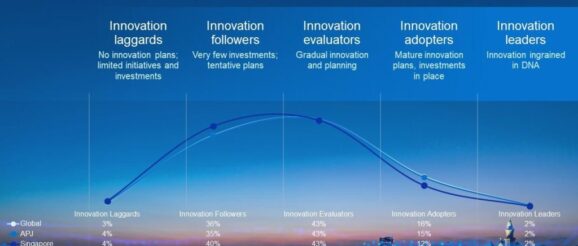Dell Technologies’ Innovation Index Uncovers Singaporean Businesses’ Anxiety Over Irrelevance in Absence of Innovation Strategy – techcoffeehouse.com

Fear of irrelevance looms over the Singaporean business landscape as a staggering 62% of respondents express concern that their organizations could be rendered obsolete within the next 3 to 5 years. The cause of this anxiety? A lack of innovation in their pipeline and organizational culture. The revelation comes from the Dell Technologies Innovation Index, a global study that surveyed over 6,600 employees across 45+ countries, aiming to shed light on the indispensable role innovation plays in driving business success.
Zooming into the Asia Pacific & Japan (APJ) region, the study delved into the perceptions of 1,700 employees from Australia and New Zealand, India, Japan, Malaysia, Singapore, South Korea, and Thailand, with 200 of them representing the dynamic city-state of Singapore.
Innovation Leaders Emerge Victorious
In the race to innovation supremacy, only a mere 13% of Singaporean organizations could bask in the glory of being deemed “Innovation Leaders” and “Adopters.” This exclusive club boasts a robust end-to-end innovation strategy, empowering them to navigate the treacherous waters of global recessions, supply chain snags, environmental upheavals, and more, all while continuing to thrive.
As the storm of recession hits, these frontrunners display an inspiring 1.3x higher likelihood of accelerating their innovation endeavors compared to their cautious counterparts – the “Innovation Followers” and “Laggards” – who prefer to hit the brakes on innovation in times of economic turmoil. The impact of this “innovation resilience” is remarkable, as it sets the trailblazers apart, making them 1.3x more likely to enjoy sky-high revenue growth, with an expected annual surge of 15% or more in 2022. A decisive factor in this unparalleled success lies in their commitment to automation, enabling teams to unleash their innovation prowess, a trait notably absent in the ranks of the “Laggards” and “Followers.”

Climbing the Innovation Maturity Ladder
The Innovation Index unforgivingly exposes the majority of Singaporean organizations languishing in the shadows of mediocrity. Falling into the “Innovation Laggards” and “Followers” categories, they desperately lack a well-defined innovation strategy, or worse, struggle to make any significant strides towards progress, pegged as the “Innovation Evaluators.”
To flourish in the innovation ecosystem, organizations must fortify their people, processes, and technologies for the challenges ahead.
People-Primed Innovation: Fostering a Culture of Creativity
One of the critical elements spotlighted in the study revolves around the development of an innovation-driven culture that embraces all ideas, where failure is celebrated as a stepping stone to success. Alas, this eludes many organizations, with a staggering 59% of respondents bemoaning their inability to innovate as much as they had hoped, leading to employee disengagement.
Unsurprisingly, 63% of respondents identify aspects of their company’s culture as the impediment to achieving their innovative potential. A disheartening revelation surfaces when leaders are put under scrutiny, with 72% of respondents feeling that their higher-ups tend to prioritize their own ideas, stifling the creative expression of their teams. The fear of failure and a lack of confidence to share ideas further accentuate the challenges faced by employees eager to contribute to their organization’s innovation journey.
Process-Primed Innovation: The Quest for Structure and Data-Driven Approaches
A structured, data-driven innovation process is a holy grail for businesses, yet the Innovation Index exposes the struggle to embed this essential element across organizations. With a meager 26% of IT Decision Makers affirming that all their innovation efforts are based on data, there is undeniable room for improvement.
To exacerbate the situation, a startling 51% of organizations admit to misaligning their innovation projects with company goals, potentially contributing to their inability to prioritize innovation effectively. Overwhelming workloads also plague the pursuit of innovation, with 51% of Singaporean respondents citing lack of time as a major barrier hindering their team’s creative potential.
Technology-Primed Innovation: Embracing Technology’s Unyielding Potential
The study unabashedly acknowledges the paramount role technology plays in enabling innovation, serving as the driving force behind an organization’s evolution or its crippling demise.
An overwhelming 88% of Singaporean organizations actively seek out cutting-edge technologies to breathe life into their innovation aspirations. Paradoxically, 63% still believe their current technology is not cutting-edge enough, fueling their anxiety about falling behind competitors.
Diving deeper, the study highlights the five technology catalysts for innovation: multicloud, edge, modern data infrastructure, anywhere-work, and cybersecurity. Despite recognizing the potential these technologies hold, many organizations grapple with complexity, often stemming from disparate cloud platforms, apps, tools, and more. This complexity comes at a steep cost – both in terms of time and money – leaving businesses little room to seize invaluable opportunities to innovate.
Key global technology obstacles to innovation include growing cloud costs, struggles with aligning overall business architecture with IT infrastructure architecture, and the time and money required to migrate apps to new cloud environments. Notably, cybersecurity threats and insecure edge devices compound the challenges, while the lack of a robust IT infrastructure to process data at the edge only adds to the complexity.
The Dell Technologies Innovation Index serves as a wake-up call for businesses across Singapore, urging them to embrace innovation as a strategic imperative. Those leading the innovation charge stand to reap the rewards of resilience and growth, while those lagging behind must recognize the urgency to adapt, lest they face irrelevance in the unforgiving landscape of tomorrow’s business world.
